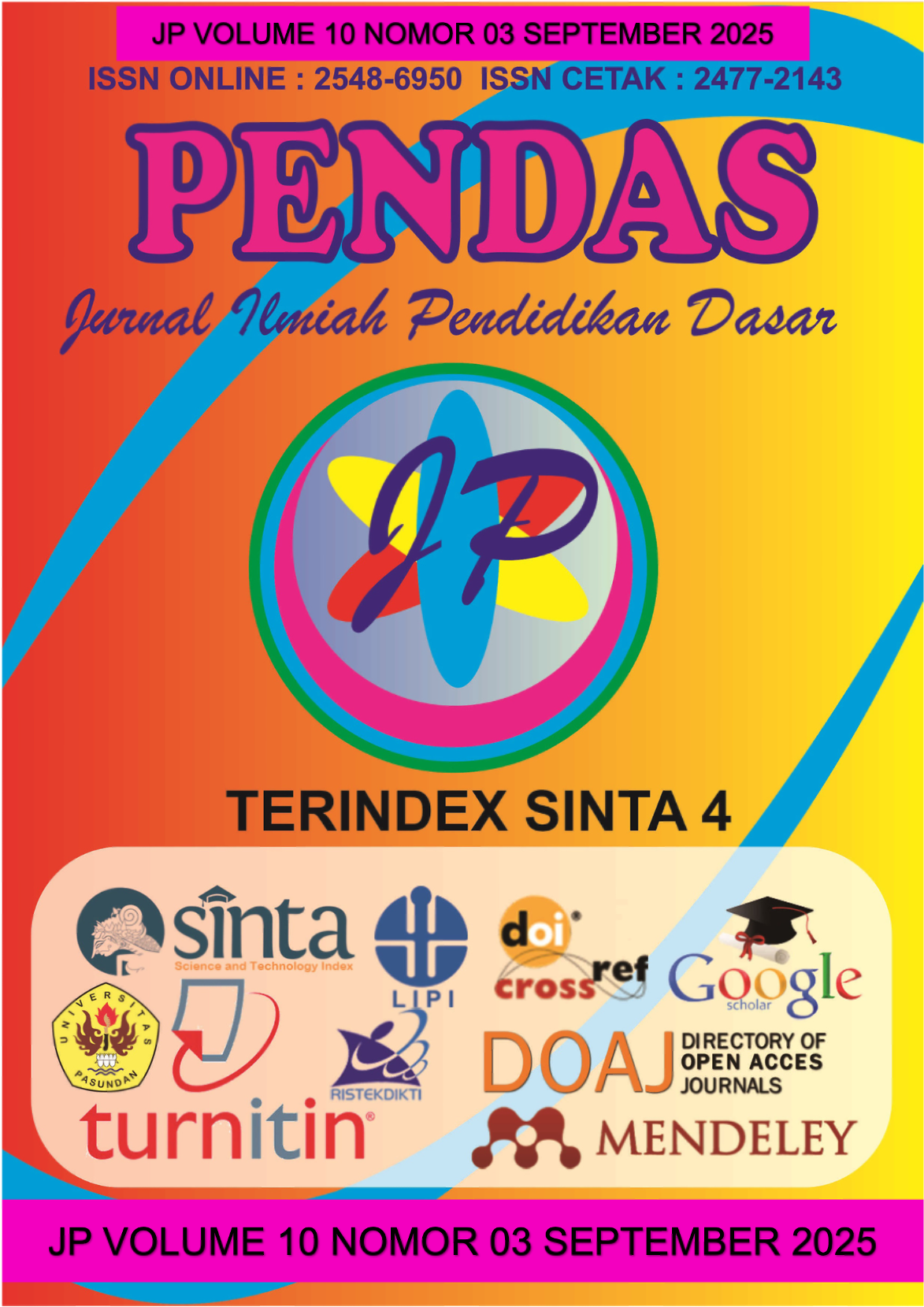EFEKTIVITAS PROBLEM BASED LEARNING TERINTEGRASI STEM DALAM MENINGKATKAN LITERASI NUMERASI DAN PEMAHAMAN KOGNITIF SISWA SEKOLAH DASAR: STUDI QUASI-EKSPERIMEN
DOI:
https://doi.org/10.23969/jp.v10i03.30801Keywords:
problem-based learning, STEM, numeracy literacy; cognitive learning outcomes; quasi-experimentalAbstract
This study aims to evaluate the effectiveness of a STEM-integrated Problem-Based Learning (PBL) model in improving elementary school students’ numeracy literacy skills and cognitive learning outcomes (understanding). A quasi-experimental design with a nonequivalent control group was used, involving two groups: an experimental group (PBL-STEM) and a control group (conventional instruction). Both groups took pre- and post-tests to measure numeracy literacy and mathematical comprehension. Data analysis included N-Gain scores, tests of normality and homogeneity, and mean-difference tests (ANOVA and t-test). The results showed that the experimental group’s average N-Gain for numeracy literacy was 41.67%, higher than the control group’s 28.57%, but this difference was not statistically significant (F = 1.799; p = 0.195). In contrast, the increase in cognitive learning outcomes in the experimental group (N-Gain = 33.64%) was significantly greater than in the control group (N-Gain = 13.98%) (t = 2.266; p = 0.035; 95% CI [1.560, 37.757]). Moreover, the mastery rate (minimum competency score = 70) for both numeracy literacy and comprehension reached 100% in the experimental class, compared to 71% in the control class. These findings confirm that PBL-STEM effectively strengthens conceptual understanding and ensures students meet minimum competency, although further optimization of intervention duration and resource support is needed to achieve significant gains in numeracy literacy. It is recommended that PBL-STEM implementation be accompanied by teacher training and adequate supporting facilities to enhance its impact on numeracy literacy.
Downloads
References
Hadi, F. R. (2021). Efektifitas Model Pbl Terintegrasi STEM Terhadap Kemampuan Berpikir Kritis Matematis Siswa Kelas V SD. Jurnal Pendidikan Tambusai, 5(3), 6644–6649. https://doi.org/10.31004/jptam.v5i3.2005
Hasudungan, A. N., Ofianto, & Ningsih, T. Z. (2022). Learning Loss: A Real Threat in Education for Underprivileged Students and Remote Regions during the Covid-19 Pandemic. International Journal of Distance Education and E-Learning, 7(1), 12–23. https://doi.org/10.36261/ijdeel.v7i1.2223
Jayanti, A. D., & Yunianta, T. N. H. (2022). Pengembangan Emometri (E-Modul Trigonometri) Dengan Project Based Learning Berbasis Steam. AKSIOMA: Jurnal Program Studi Pendidikan Matematika, 11(2), 1116. https://doi.org/10.24127/ajpm.v11i2.4881
Kemendikbud. (2021). Framework Asesmen Kompetensi Minimum (AKM). In Pusat Asesmen Dan Pembelajaran Badan Penelitian Dan Pengembangan Dan Perbukuan Kementerian Pendidikan Dan KebudayaanPembelajaran Badan Penelitian Dan Pengembangan Dan Perbukuan Kementerian Pendidikan Dan Kebudayaan. Badan Penelitian dan Pengembangan dan Perbukuan Kementerian Pendidikan dan Kebudayaan KATA.
KemendikbudRI. (2023). Asesmen Nasional. https://www.kemdikbud.go.id/main/blog/2021/03/agama-dan-pancasila-tetap-ada-dalam-peta-jalan-pendidikan
Kwon, H., & Lee, Y. (2025). A meta-analysis of STEM project-based learning on creativity. STEM Education, 5(2), 275–290. https://doi.org/10.3934/steme.2025014
Lutvi, S., & Wakhudin, W. (2023). Sulit Belajar Akibat" Learning Loss" Pasca Pandemi Covid-19. Primary, 2(3), 169–177. https://primary.ump.ac.id/index.php/primary/article/download/66/68
Murtyaningsih, R., Utaminingsih, E. S., & Munawar, M. (2025). Optimizing STEAM-Based Differentiated Instruction to Enhance the Effectiveness of Surah At-Tin Memorization among Fourth- Grade Students at Elementary School. 4(1), 307–324.
Ndiung, S., & Menggo, S. (2024). Project-Based Learning in Fostering Creative Thinking and Mathematical Problem-Solving Skills: Evidence from Primary Education in Indonesia. International Journal of Learning, Teaching and Educational Research, 23(8), 289–308. https://doi.org/10.26803/ijlter.23.8.15
Ningsih, T. H. I., Supriyono, S., & Rahayuningsih, S. (2024). Penerapan Pendekatan Stem Untuk Meningkatkan Pemahaman Konsep Siswa Sd Di Kabupaten Pasuruan. JP2M (Jurnal Pendidikan Dan Pembelajaran Matematika), 10(2), 342–349. https://doi.org/10.29100/jp2m.v10i2.5654
Nurtriasih, D. (2021). Penge,bangan Perangkat pembe;ajaran Menggunakan Model Problem Based Learning (PBL) dengan pendekatan STEM untuk Melatihkan Kemampuan Berpikir Matematis Siswa. Universitas Sunan Ampel Surabaya.
OECD. (2023). PISA 2022 Results Indonesia. Factsheets, 1–9. https://www.oecd.org/publication/pisa-2022-results/country-notes/malaysia-1dbe2061/
Purnama, R. N., Rianti Cahyani, & Nandang Arif Saefuloh. (2024). Implementasi Model Problem Based Learning Terintegrasi Stem Untuk Meningkatkan Kemampuan Literasi Matematis. UJMES (Uninus Journal of Mathematics Education and Science), 9(1), 026–031. https://doi.org/10.30999/ujmes.v9i1.2684
Pusat Asesmen Pendidikan. (2024). Literasi Matematika pada PISA 2022. Pusat Asesmen Pendidikan Badan Standar, Kurikulum, dan Asesmen Pendidikan Kementerian Pendidikan, Kebudayaan, Riset, dan Teknologi.
Shongwe, B. (2024). The effect of STEM problem-based learning on students’ mathematical problem-solving beliefs. Eurasia Journal of Mathematics, Science and Technology Education, 20(8). https://doi.org/10.29333/ejmste/14879
Siswanti, T., & Widjajanti, D. B. (2024). Exploration Influence Problem-Based Learning STEM-based toward Ability Literacy Mathematics Middle School Students. International Journal of Multicultural and Multireligious Understanding, 858–869.
Spink, J., Cloney, D., & Berry, A. (2022). STUDI KESENJANGAN PEMBELAJARAN-1 Tak Sekadar Huruf dan Angka: Pengaruh Pandemi COVID-19 pada Kemampuan Literasi dan Numerasi Dasar Siswa di Indonesia. Palladium. http://www.inovasi.or.id
Suciana, D., Hartinawati, Sausan, I., & Meliza. (2023). A Meta-Analysis Study: The Effect of Problem Based Learning Integrated with STEM on Learning Outcomes. European Journal of Education and Pedagogy, 4(2), 133–138. https://doi.org/10.24018/ejedu.2023.4.2.619
Utaminingsih, E. S., & Ellianawati, E. (2025). Development of Steam-Based E-Modules on Human Circulatory Topics Containing Critical Reasoning and Independent Characters. Turkish Online Journal of Distance Education-TOJDE, 26(1), 48–84.
Utaminingsih, E. S., Ellianawati, Sumartiningsih, S., Wuriningsih, F., & Puspita, M. A. (2024). Development of science literacy competency evaluation instruments on human circulatory topic. Thabiea : Journal of Natural Science Teaching, 7(1), 56–78.
Downloads
Published
Issue
Section
License
Copyright (c) 2025 Pendas : Jurnal Ilmiah Pendidikan Dasar

This work is licensed under a Creative Commons Attribution 4.0 International License.














































